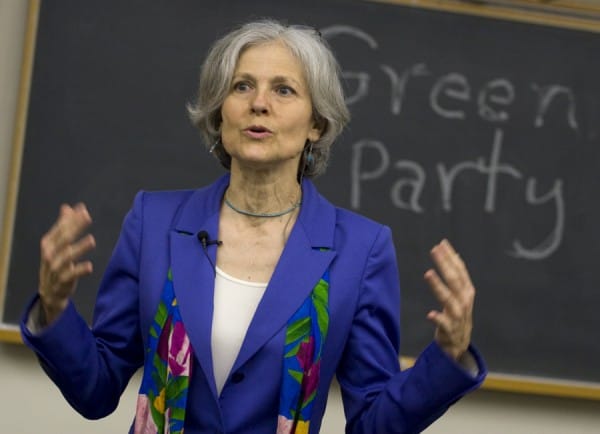Green Party Candidate Jill Stein's Green New Deal

(Credit: Jillstein.org)

In late January, Green Party presidential candidate Jill Stein released a video entitled "A People's State of the Union: A Green New Deal for America." Over the course of 45 minutes, Stein addresses the economy, the environment, unemployment, the 1%, and many more issues that the Green Party believes are dire. After outlining the numerous issues facing Americans today, Stein then offers the Green Party's solution: the Green New Deal.
The Green New Deal is comprised of four main tenets, the first of which is called the Economic Bill of Rights. In Stein's Economic Bill of Rights, she guarantees every citizen a job through the Full Employment Program, which would create 25 million jobs through a nationally-funded, locally-controlled employment initiative.
The Economic Bill of Rights continues by establishing the right to a living wage, safe working environment, fair trade, and the option to unionize without fear of reprisal. The Economic Bill of Rights establishes socialized healthcare, federally-funded public education, affordable housing and utilities, and finally, proportionate tax programs.
According to Stein:
"These solutions are green because they create an economy that makes our community sustainable and healthy."
The second pillar of the Green New Deal is labeled, "A Green Transition." The transition program seeks to evolve our current economy into a "green" economy like the one imagined in The Green New Deal's Economic Bill of Rights. Transitions include investing in green businesses and local communities, prioritizing green research, and providing green jobs through the Full Employment Program.
The third tenet of the Green New Deal confronts the issue of financial reform. Stein's program claims to relieve the debt overhang, democratize monetary policy in order to return control to the public, and restructure banks that are "too big to fail." The financial reform program continues by assuring that the Green Party will end taxpayer-funded bailouts for financial companies, regulate all financial derivatives to promote transparency, restore the Glass-Steagall separation, establish a 90% tax on bonuses for bailed out bankers, and support the formation of publicly-owned banks that function as non-profit utilities.
The final pillar of the massive overhaul of the US economy is the establishment of a "Functioning Democracy." The Functioning Democracy program will completely restructure politics to fit the Green Transition and Financial Reform programs. The Green Party promises to revoke corporate personhood, protect your right to vote, abolish the electoral college, review federal preemption law, repeal the Patriot Act, and reduce military spending, among other promises.
Inspired and authored in the likeness of FDR's New Deal in the 1930s and 40s, Stein calls out both parties in her address, placing the blame for the current state of the union on the extreme bipartisan politics plaguing America today. She explains that her programs will lead America into a "green" future:
"The Green New Deal is an emergency 4 part program of specific solutions for moving American quickly out of crisis and into the secure, Green future."



